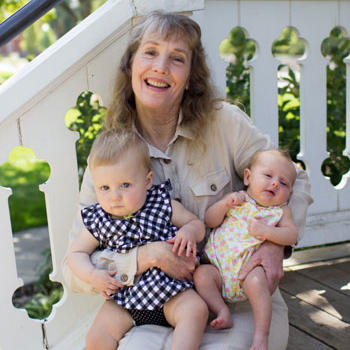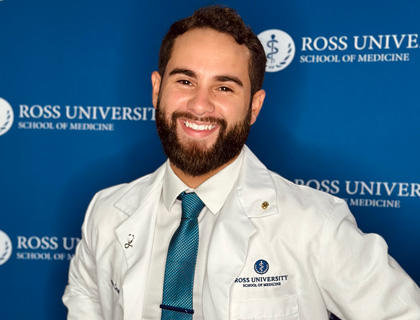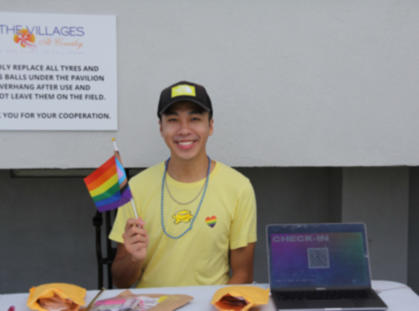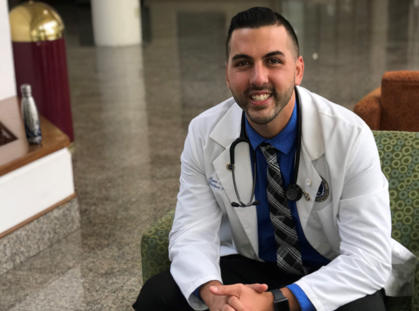Many people continue to be outraged and horrified at the complacent ignorance and incessant police brutality that stems from racial biases and macroaggressions. The cyclical issue has again throttled progression, this time becoming so prevalent and overwhelming that many don’t know where to begin. It starts with a few steps — acknowledging social inequities, starting to have the uncomfortable conversations and determining how to enforce tangible changes.
One Ross University School of Medicine (RUSM) student, Elaine Luther, wants to drive awareness of inequality and advocate for an even playing ground.
“I am white. I have no ill will against others due to their race, but lately, I have to admit that I've had white privilege,” said the self-described ‘mature’ student who will graduate this year. “Although I don't consider myself better than anyone else because I am white, watching the recent videos of Black men getting murdered, has made me realize how unfairly Blacks are treated. This cruelty has been invisible to me until the cell phone camera began documenting these horrible incidents and publishing them online. We now see that their problems are very real, even horrific.”
Ready to take a stand, Elaine encourages others to join her efforts. Here are a few effective ways you can contribute:
1. Stand Up for Justice. If you see something, say something.
If Elaine sees a Black person being confronted on the roadside, she plans to stay close, ready to ensure fair treatment. “I had nightmares about the George Floyd video and as a medical student, I might have tried to reason with those four police officers to say they were suffocating him.”
2. Check Your Implicit Bias. We all may have unconscious attitudes or stereotypes that affect our understanding, actions and decisions. Take a free implicit bias test.
Elaine remembers not-so-subtle glances and sneers from some whites when spelling out her last name and referencing Martin Luther King. She used to ignore the prejudicial looks to avoid confrontation but says that can no longer happen. “Just because I’m white doesn’t mean I share in your attitude.”
3. Don’t Become a Bully.
Feeling bored, frustrated with restrictions and drained from social isolation can lead to impulsive action. Ensure you’re not becoming a bully during these tumultuous times.
4. Educate Yourself.
There are several credible resources to help us understand the different lenses in which others view racism and social justice. Here are some to check out:
- “White Fragility: Why It’s So Hard for White People to Talk About Racism”
- “Stamped from the Beginning: The Definitive History of Racist Ideas in America”
- “Between the World and Me”
- “The New Jim Crow: Mass Incarceration in the Age of Colorblindness”
- “Just Mercy: A Story of Justice and Redemption”
- “13th” on Netflix
- “When They See Us” on Netflix
5. Get Involved.
Whether you are an RUSM graduate, a current or prospective student, or outside of the RUSM community, there are an abundance of ways to act:
- Join, volunteer or donate to an organization committed to fighting social injustice such as Color of Change or the Leadership Conference on Civil and Human Rights.
- Support Black-owned businesses in your area, using the Support Black Owned directory or contacting your local Chamber of Commerce.
- Sign a petition to help constitute change – with the U.S. government or through the Change Organization.
- Learn more about RUSM’s involvement on its Social Justice Commitment page.
If we each partake in self-reflection and begin to educate ourselves, together we can combat social disparities and injustices. “We white people who are lucky enough to have privilege must stand up for our Black brothers and sisters,” Elaine urges others. “We need to figure out what we can do to unmask those who are racist, and to discipline them.”
About Elaine Luther
Elaine enrolled at Ross University after raising four children. Though she aspired to become a doctor at a young age, gender inequities in the medical field during college led her to try nursing, which was not the right fit. So she spent her career as a broadcast journalist, teacher and technical writer. When the market affected her job stability, the Texas native knew it was time to live her dream, especially with support from her children.
“I always told my kids to do whatever made them happy and now it’s my turn,” said the future family-medicine resident who dreams of becoming a small-town country doctor. “Medical school has humbled me — it’s more difficult than I originally thought.”
Elaine spent the last few months studying online in the woods, situated in a small cabin in Georgia and found it peaceful, a stark contrast to the current racial climate.
RUSM Diversity and Inclusion Taskforce
A group of 16 RUSM students, faculty, colleagues and alumni have begun leading a holistic review of diversity, equity and inclusion at the University and will deliver a report of short- and long-term recommendations within the next few months. This is the first of many steps to sustain change at the infrastructure level.
As RUSM prepares to engage, train, educate, advocate and invest in this process to align with the Black community at our University and in all the underrepresented and marginalized communities in which we serve, we invite others to share feedback with us because we know the fight for social justice is a community collaboration.




